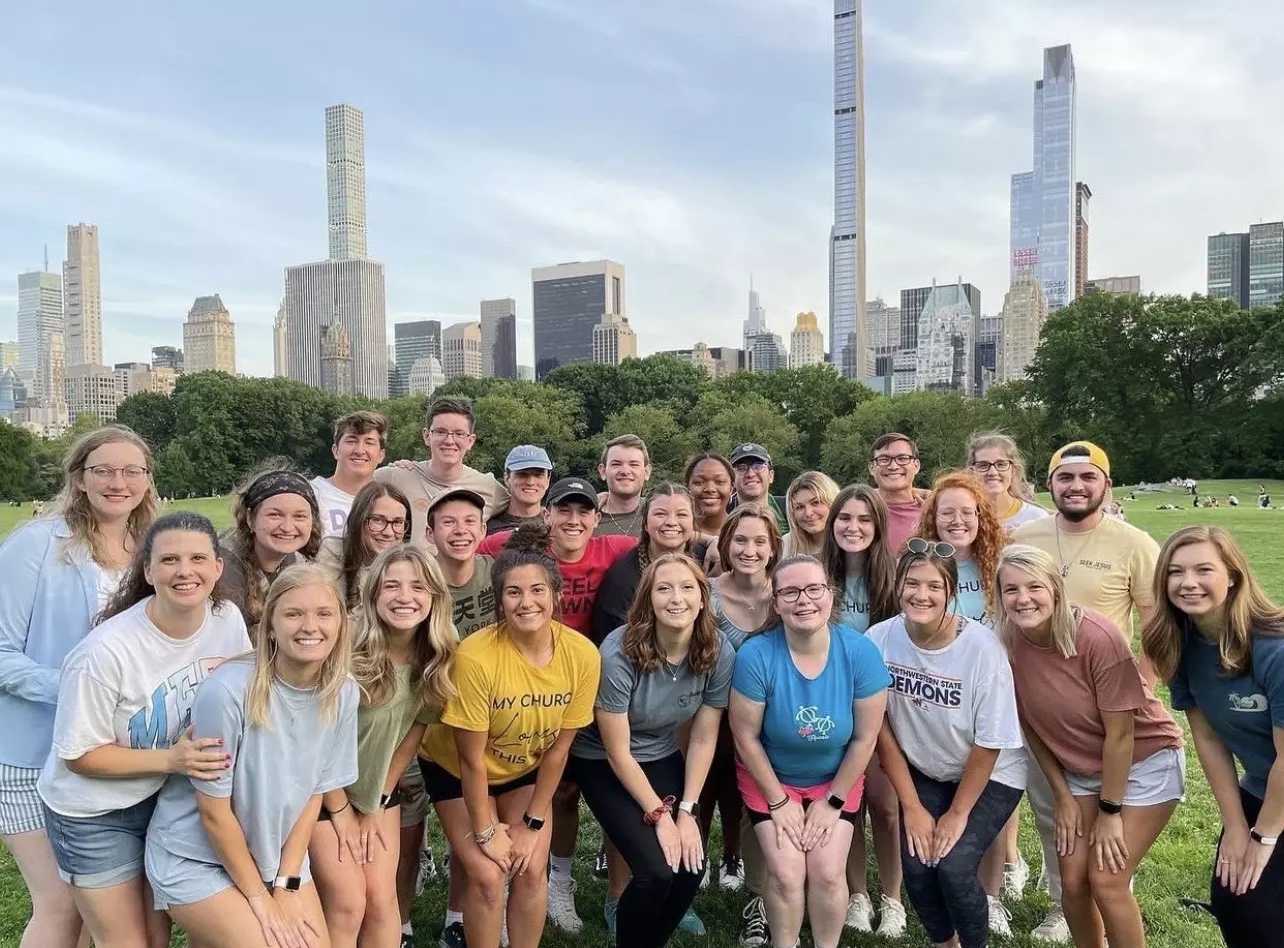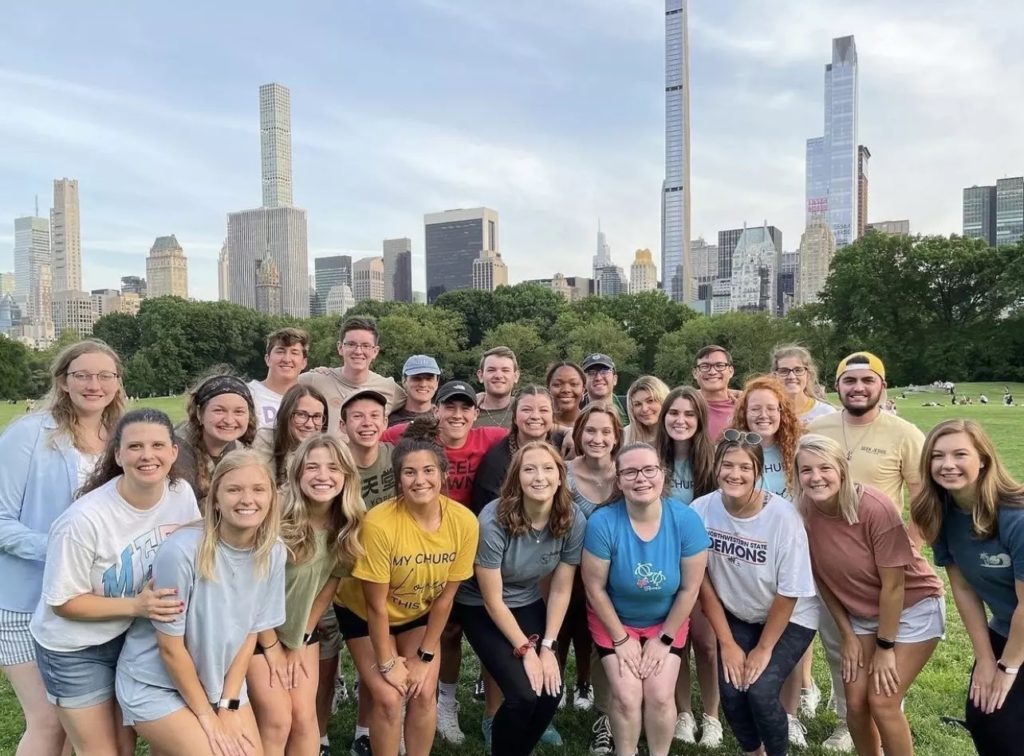NASHVILLE (BP) – The North American Mission Board’s GenSend program gets college students out of their comfort zones and into hurting, broken communities. Students spend their summer in a major city, where ministry might look like serving the homeless, playing at the park or a having a conversation over coffee.
One member of a GenSend team in Denver discovered the importance of meeting people where they are.
“I went to the park and passed out a water to a guy named Louis, and it was his first night being homeless,” said Kirby Logan, who will be a senior at Carson-Newman University this fall. “We had this conversation about how he didn’t have any friends in Denver and how he just wanted to get out. Denver had really broken him. I gave him my big Bible that I had had all summer and told him that he can read it and hear from God. I started to walk away, and I remembered that [the other GenSenders] had a cookout going a block down the street. I walked back to the bench where I had left him [to invite him to the cookout] and he had already opened the Bible and started reading.”
Jason Tipton, Send Relief’s national ministry center director for the Western U.S., said he built strong bonds with the GenSenders in Denver and saw firsthand how the work changed them.

“For me, it’s about investing in the next generation. My ministry is shifting to be more of a catalyst [for] inviting them into the work that God is already doing. Sometimes, we think about teaching as classroom instruction, but providing them [with] opportunities to be with our neighbors [is] where I think learning actually takes place.”
That was true for Logan, who said he learned that “poverty looks different for every person.”
“Poverty is not just not having a house or food,” Logan said. “It can be having no friends or struggling with deep depression or needing a job and not knowing anyone that can help you. We intentionally went and talked to people who looked like they needed a conversation. Whether it was a Gospel conversation or not, it was nice for them to know that they had someone that cared enough to talk to them.”
People in Denver often decline invitations to church, he said, which made their conversations all the more crucial.
“If a person knows you and knows that you have a relationship with Jesus, asking them into a relationship with Jesus is much more powerful than inviting them to church,” he said. “[I learned that] people want to be able to trust you before they trust God.”
Keaton Hubbs, who also will be a senior at Carson-Newman, served alongside Logan in Denver. Hubbs said she was struck by the spiritual lostness in the city.
“Satan is out here trying to steal, kill and destroy anything that is good and holy,” she said. “What I learned was that through true intercession with fellow believers and speaking the name of Jesus over every single situation, Satan has no place and he will flee. I now know so fully that we can trust in the Lord in everything because He cares for us and He is never going to leave us.”
Hubbs said she and the team spent time planting seeds of truth and hope, but added that those seeds take time to bear fruit.
“Restoration isn’t just making a bad thing better,” she said. “We don’t just desire to clean up a person and let him look nice. We desire the full restoration of a person, which can take time.”
Lauren Potter, a third Carson-Newman senior on the Denver team, said many people she met seemed to be dissatisfied with life.
“Most people in Denver are not from Colorado because they come there from other places in search of something,” Potter said. “Pretty much everyone there wants to have something to die for that they’re huge on. There’s a lot of spiritual people but not religious people.
“One of our biggest takeaways as a whole group was that a lot of times, we [tend to] romanticize the more attractive styles of ministry. One thing that we spent a lot of time thinking about was being a faithful presence. We have learned to be content in the mundane.”
That “faithful presence” idea was also a big part of the ministry of a GenSend team in New York City.
Riley Bishop followed God’s lead to the Big Apple before he begins his junior year at Tennessee Tech.
“One thing I learned with the GenSend program is that everything you do can be missional,” Bishop said. “A lot of days we don’t have big goals. [Our goal is to be] missional by visiting coffee shops or playing basketball.
“There’s a big stigma around New York that people don’t want to talk to you, and that’s just not the case. New York is so fast, so busy and so lonely that people want to slow down and get to know who you are. You can live intentionally and missionally anywhere, and you can work through the small things that really matter.”
Tipton said he often encourages students to do something that they wouldn’t normally do.
“Within collegiate experiences, we all have great opportunities to do different things with our summers,” Tipton said. “[I encourage everyone to] leave your contexts that you’re used to and allow God to put you into a different context and see where God is working. My worldview has always been expanded when I allow myself to learn from other situations. When we take a risk for the kingdom, there’s always a reward on the other side.”
Logan agreed.
“Go somewhere that you’ve never been and where you’re going to learn things that you’ve never learned before,” he said. “Don’t let the price of GenSend scare you – there are people who have been praying for you to come to their city.”
Bishop said he had the best summer of his life.
“It was definitely hard in a bunch of ways that I didn’t think would be hard, but it was totally worth it,” he said.
Published August 1, 2022
